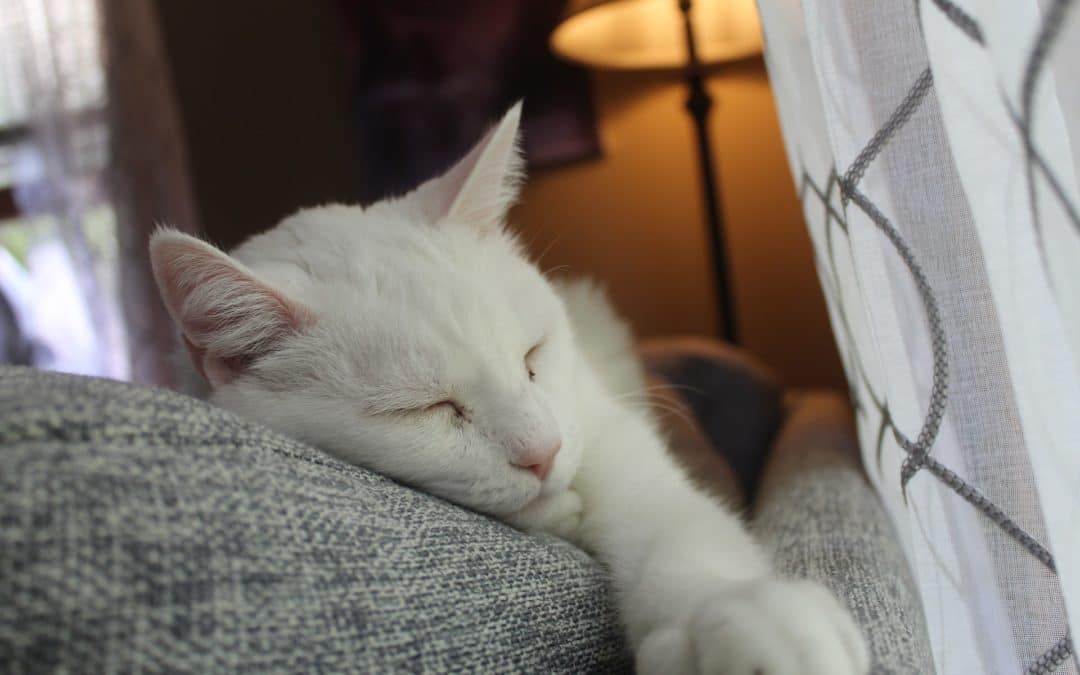Is your cat slowing down, turning gray, or showing other signs of aging? As cats age, their behavior, activity levels, and appearance will all begin to change. Here at East Valley Animal Hospital, we aim to promote long, healthy lives for cats of all ages. Today we’re offering a few tips on caring for a senior cat, so you can help your pet stay healthy, happy, and comfortable.
What to Expect with an Aging Cat
Cats that are over 11 years old are considered “seniors.” However, some cats may show signs of aging sooner or later than others. Older cats are generally less active, have a smaller appetite, and sleep more than younger cats. An aging cat’s fur might also turn gray, grow thinner, or become duller.
Changes in behavior and appearance are sometimes a sign of something more serious, so make sure to bring your cat to the vet as soon as you notice any of these signs of aging. We’ll determine whether or not your cat has any health conditions that are causing the changes, or if they are just aging normally.
Senior Cat Wellness Exams
When your cat begins to show signs of aging, they should start going to the vet every six months in order to monitor their health. We’ll take note of their weight, mobility, dental health, diet, and other factors at each appointment, so we can identify any changes and provide swift treatment. Regular wellness exams will ensure that age-related illnesses can be diagnosed and treated early on, allowing your cat to live a long, healthy life.
Caring for Your Senior Cat: Six Helpful Tips
1: Keep Them Indoors
As cats age, their senses weaken, and they become less able to detect danger and defend themselves. Older cats also have weak immune systems, and are less likely to recover from any diseases they contract from other outdoor cats. Senior cats with dementia might even get lost and forget their way back home. Keeping your aging cat indoors will help them stay safe and live longer.
2: Encourage Activity
Although cats become less active as they get older, it’s important for their health to keep them moving. Moderate exercise increases blood flow and mobility in older cats to help them maintain better health. Encourage your senior cat to stay active by playing with them daily and providing stimulating toys. Cat furniture such as scratching posts and climbing trees can also help to keep your cat active.
3: Provide Plenty of Water
Cats prefer running water over stagnant water, so providing a water fountain may encourage your senior cat to drink more water. Plenty of accessible water sources helps prevent dehydration, constipation, kidney disease, and urinary tract disease in senior cats.
4: Make Your Home Senior-Friendly
If your cat’s food and water sources or favorite napping spots are on high surfaces, you’ll need to make some adjustments to your home. Cat trees and carpeted ramps make it easier for cats to reach high surfaces without injuring themselves.
Older cats also need more padding for warmth and comfort. Make sure to provide padded beds in your cat’s usual napping areas. Orthopedic cat beds offer relief from any arthritic pain and joint pressure your senior cat may be experiencing.
5: Maintain Their Hygiene
Another way to keep your cat healthy and comfortable is by helping them maintain good hygiene. Regularly brushing your cat’s fur helps reduce hairballs and promotes a healthy coat. If you have a long-haired senior cat, occasional baths can help manage their fur as well.
You should also be regularly trimming your senior cat’s nails and brushing their teeth. Nail trimming prevents pain from overgrown nails, while brushing their teeth prevents gum disease and other painful dental problems. Scheduling professional teeth cleanings and dental exams for your cat will also improve their oral health.
6: Prepare for Vet Visits
To best prepare for your senior cat’s routine vet visits, make sure to:
- Provide your vet with a list of all of the food, treats, supplements, and medications you give your cat.
- Bring a list of questions you may have about your cat’s health, behavior, appearance, etc.
- Record video of changes in your cat’s behavior or mobility so your vet can get a better understanding.
Senior Cat Wellness Exams in Gilbert
If your furry friend is growing older, regular wellness exams with East Valley Animal Hospital are the best way to maintain their health. Our compassionate team is experienced in providing gentle examinations for cats of all breeds, ages, and personalities. Call 480-892-1577 today to make an appointment for your senior cat.
Images used under creative commons license – commercial use (4/25/2022). Photo by Noah Moquin on Unsplash

